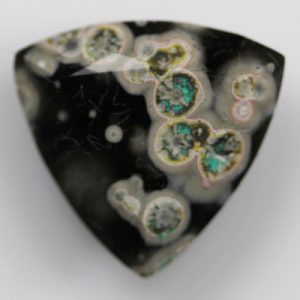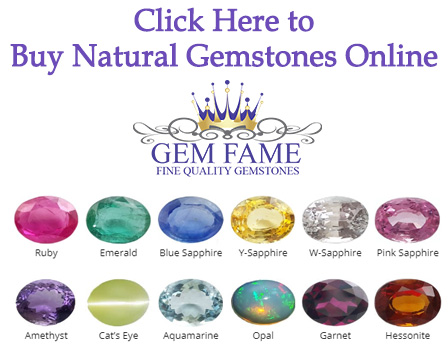Cosmic Obsidian
Cristobalite is a polymorph of all of the members of the Quartz Group of minerals. These include Quartz, Coesite, Tridymite and Stishovite. A polymorph means that these minerals have the same chemistry, SiO2, but different structures. Cristobalite is common as microscopic crystals in volcanic rocks but larger, well formed crystals found in the vesicles of volcanic rocks are rare. Cristobalite itself could not be faceted, but bright white Cristobalite crystals captured in transparent black Obsidian (as pictured above) can make very attractive gems. These gems have been called Cosmic Obsidian. Material from Lipari Island, Messina Province, Sicily, Italy is the main source of this type of gem.
Notable occurrences include the type locality of Cerro San Cristóbal, Mun. de Pachuca, Hidalgo, Mexico; Eifel District, Germany; the Ellora Caves, Maharashtra, India; Lipari Island, Messina Province, Sicily, Italy; Goroyama, Japan; about 150 km north of Auckland, New Zealand; in the USA in the San Juan Mountains, San Juan County, Colorado; Coso Hot Springs, Inyo County, California; near Crater Lake, Klamath County, Oregon; and many other locations.
| Chemical Formula: | SiO2 |
| Silicon Dioxide | |
| Molecular Weight: | 60.08 gm |
| Composition: | Silicon | 46.74 % | Si | 100.00 % | SiO2 |
| Oxygen | 53.26 % | O | |||
| 100.00 % | 100.00 % | = TOTAL OXIDE |
| Crystallography: | Tetragonal – Trapezohedral |
| Crystal Habit: | As pseudo-octahedral crystals, to 4 mm, with {110} and {331}, rarely pseudocubic. Commonly dendritic to skeletal; as spherulites to several cm; fibrous or microcrystalline (“opal”), massive. |
| Twinning: | On {111}, common, interpenetrant, polysynthetic, repeated. |
| Cleavage: | None |
| Fracture: | Irregular/Uneven |
| Tenacity: | Brittle |
| Moh’s Hardness: | 6.0 – 7.0 |
| Density: | 2.32 – 2.36 (g/cm3) |
| Luminescence: | Fluorescent; LW UV = Green Red; LW UV = Green Red |
| Radioactivity: | Not Radioactive |
| Other: | Thermal properties: inverts from high- or ß-Cristobalite at 286°C or below |
| Color: | Colorless, White, milky White to Yellowish, Blue-Gray, Gray; Colorless in transmitted light. |
| Transparency: | Transparent to Translucent |
| Luster: | Vitreous |
| Refractive Index: | 1.484 – 1.487 Uniaxial ( – ) |
| Birefringence: | 0.003 |
| Dispersion: | None |
| Pleochroism: | None |


